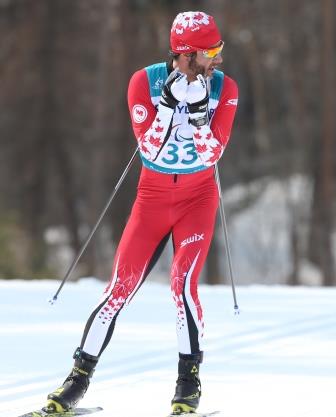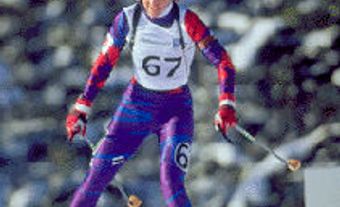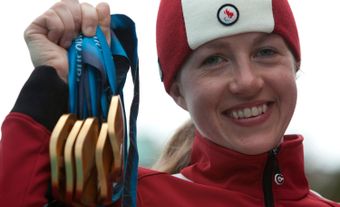
Brian McKeever, cross-country skier (born 18 June 1979 in Calgary, AB). McKeever has won 17 medals in men’s cross-country skiing and biathlon at the Paralympic Winter Games between 2002 and 2018. He has the record for the most medals (17) and the most gold medals (13) for Canada at the Paralympic Winter Games. In 2010, McKeever became the first athlete to be named to a country’s Olympic and Paralympic Winter Games team in the same year.
Family Background
Brian McKeever’s father, William McKeever, grew up in rural Alberta, on a farm east of Calgary. Both he and his sister lost much of their sight while they were still children due to Stargardt disease, a hereditary macular degeneration of the eye that causes the loss of central vision. Their father also suffered from the disease.
Jean Yokoyama, Brian’s mother, was the daughter of Masanari and Tamae Yokoyama, who immigrated to Canada from Japan and owned a berry farm in Vancouver. In 1942, during the Second World War, they were taken to a Japanese internment camp in Sandon, British Columbia, where (according to William) they had “no heat, no water and no insulation in the walls.” Jean was born after her family was released from Sandon. She was raised in New Denver, a nearby mining town, where her father worked for the Canadian Pacific Railway.
In 1968, William and Jean married. William, who earned a major in history, was a physical education teacher for 29 years. He was also an athlete who was active in golf, cycling, hiking and cross-country skiing. Jean was a school librarian.
Childhood
Brian McKeever was born in Calgary, Alberta, on 18 June 1979, the younger of two children of Jean and William McKeever. His brother, Robin, was born on 8 April 1973.
McKeever started skiing at the age of three and competed in his first cross-country skiing race at the age of 12. He was part of the Jackrabbit program in Calgary, named after former Canadian cross-country skiing national team coach Herman “Jackrabbit” Smith-Johannsen, who lived until he was 111 years old.
In addition to cross-country skiing, McKeever played soccer, basketball and volleyball. However, at the age of 14, Brian chose to focus on cross-country skiing, following the path of his brother, Robin, who was also a high-performance cross-country skier. At that point, Robin had just competed for Canada at the 1993 International Ski Federation (FIS) Junior World Ski Championships in Harrachov, Czech Republic, where he finished in 14th place in the men’s 10 km classic event.
Like Robin, Brian also competed at the Junior World Ski Championships. In 1998, he travelled to Pontresina, Switzerland, and finished in 15th place in the men’s 4x10 km relay, 55th place in the men’s 10 km freestyle and 70th place in the men’s 30 km classic. McKeever wore his brother’s cross-country skiing equipment during the junior championships, strengthening the bond between the brothers. “That was this huge moment where he believed in what I was capable of,” McKeever told Nicholas Köhler of Maclean’sin 2010.
Vision Trouble
McKeever first realized that he was having problems with his eyesight in 1997, when he had to hold a book very close to his face to read. Over the course of one university term, he went from being able to read the blackboard from the back row of the lecture hall to not being able to read the blackboard from the front row.Then, in April 1998, McKeever realized that he couldn’t see the road signs while travelling on the streets of Calgary. Shortly afterwards, McKeever booked an eye appointment and was diagnosed with Stargardt disease, the same disease that Brian’s father and aunt had.
In January 1999, McKeever finished in the top 10 (seventh and eighth) in two FIS cross-country skiing competitions in Duntroon, Ontario. At the time, he still had partial vision at 20/80. Later that year, McKeever was approached by Kaspar Wirz, coach of the Canadian Para-Nordic National Cross-Country Ski Team, who had heard of McKeever’s condition. “I laughed at him,” McKeever told Deena Waisberg of Reader’s Digest in 2010. “I didn’t consider myself as having a disability.”
In March 2000, McKeever finished fourth at a FIS able-bodied race in Canmore, Alberta,but his eyesight continued to deteriorate. By 2001, McKeever was legally blind (20/200 vision) and had accepted Wirz’s invitation.
Para-Nordic National Ski Team
McKeever’s first international success with the team came in January 2001, when he placed second in a Para-Nordic race in Germany. McKeever lost to Germany’s Frank Höfle, a 10-time gold medallist in cross-country skiing at the Paralympic Winter Games. While Höfle raced with a guide, McKeever (who only had 10 percent vision) relied on his peripheral vision alone. After the race, Höfle strongly recommended that McKeever use a guide for future races, as he believed McKeever would have beaten him if he had had some help.
McKeever needed not only a high-performance skier who would be able to keep up with him but also someone he could trust to manage the challenging courses. The obvious candidate was his brother, Robin, an accomplished skier and former Olympian who doesn’t have the gene that causes Stargardt disease. Robin first volunteered to be Brian’s guide at a World Cup race in Salt Lake City in 2001. The partnership would last over the next nine years.
2002 Paralympic Winter Games
In 2002, McKeever competed in his first Paralympic Winter Games in Salt Lake City, winning gold medals in the men’s 5 km classic and 10 km freestyle and a silver medal in the men’s 20 km freestyle. McKeever competed in the B3 division, for athletes with the least severe visual impairment.
McKeever won his gold medals comfortably. He beat silver medallist Irek Mannanov of Russia in the men’s 5 km classic by 55.8 seconds and again in the men’s 10 km freestyle by 38.2 seconds. McKeever was Canada’s flag bearer in the closing ceremonies.
2006 Paralympic Winter Games
In the year prior to the 2006 Paralympic Winter Games in Turin, Italy, McKeever had great success in the men’s para-biathlon, winning three gold medals at the 2005 International Paralympic Committee (IPC) Athletics World Championships in Salt Lake City. McKeever won the 5 km, 7.5 km and 20 km biathlon, in addition to winning the gold medal in 10 km freestyle cross-country skiing.
At the 2006 Paralympic Winter Games in Turin, McKeever won bronze in the men’s 7.5 km individual biathlon, as well as three medals in cross-country skiing: gold in the men’s 5 km freestyle and 10 km classic and silver in the men’s 20 km classic.
Able-Bodied Competition
McKeever continued to participate in able-bodied cross-country skiing competitions with considerable success. Without an aid, he won two medals each at the 2003 Canadian Cross Country Skiing Championships in Duntroon, Ontario, and the 2005 Canadian Cross Country Skiing Championships in Prince George, British Columbia.
The following year, on 13 August 2006, McKeever won the gold medal at the Australia/New Zealand Cup in Snowfarm, New Zealand, in the men’s 10 km freestyle. His success continued in 2007, as he won the silver medal in the men’s 30 km mass pursuit at the Nor-Am Cup in Canmore on 28 January 2007.
McKeever also qualified for the 2007 FIS World Ski Championships in Sapporo, Japan, representing Canada in the men’s 15 km freestyle, 30 km mass pursuit and 50 km classic mass start. He was the top Canadian in the men’s 15 km freestyle, placing 21st overall.
Although McKeever suffered significant injuries over the next couple of years, breaking a rib in 2008 and an arm in 2009, his success continued. Prior to the 2010 Paralympic Winter Games in Vancouver, McKeever reached the podium twice more in able-bodied cross-country skiing competitions. He won a silver medal in the men’s 10 km freestyle at the 2009 Canadian Cross Country Skiing Championships in Duntroon, Ontario (where he was only beaten by his brother, Robin), and a gold medal in the men’s 50 km classic at the 2009 Nor-Am Cup in Canmore.
Selection for 2010 Winter Olympics
McKeever’s 50 km victory in Canmore led to his selection for the Canadian team for the 2010 Olympic Winter Games in Vancouver. However, even though McKeever was selected to the team, he didn’t get the chance to compete. In a controversial decision, McKeever was left off the start list for the 50 km race. Canadian cross-country skiing coach Inge Braten could only submit a maximum of four skiers to enter the race and decided on Devon Kershaw, Ivan Babikov, George Grey and Alex Harvey. Although he asked to have five skiers compete in the race, the FIS denied the request. While McKeever never got the chance to compete at the Olympics, his selection for both the 2010 Olympic and Paralympic teams was a first in the history of the Winter Games.
2010 and 2014 Paralympic Winter Games
At the 2010 Paralympic Winter Games in Vancouver and the 2014 Paralympic Winter Games in Sochi, Russia, McKeever dominated the competition, winning three gold medals in the men’s sprint, 10 km and 20 km races each time. Between the two Paralympic Winter Games, McKeever also won a total of five more gold medals at two IPC World Championships (three in 2011 and two in 2013).
After 2010, McKeever’s brother, Robin, was named head coach of the Canadian Para-Nordic National Ski Team, and Erik Carleton became McKeever’s primary guide. Carleton knew Brian well, as they had skied together on Canada’s national development team. Carleton and Graham Nishikawa shared guide duties for McKeever’s10 km freestyle and 20 km classic races at the 2014 Paralympic Winter Games in Sochi.
Many felt that McKeever’s most impressive race was the 1 km sprint at the 2014 Paralympic Winter Games in Sochi. Even though McKeever fell at the start of the race, he was able to get back up and pass all of his competitors to win the gold medal.
Career 2014–17
McKeever continues to compete in both para-nordic and able-bodied competitions. At the 2015 IPC World Championships in Cable, Wisconsin, he won the gold medal in the men’s 20 km cross-country race for the visually impaired, with Carleton as his guide. Between August 2014 and February 2016, McKeever also reached the podium six times in FIS able-bodied competitions.
At the 2017 IPC Para-Nordic World Championships, McKeever won gold in the 10 km and 20 km cross-country races with guide Graham Nishikawa. He was also part of the bronze medal team in the 4x2.5 km relay — Canada’s first podium in the event.
2018 Paralympic Winter Games
McKeever was chosen as Canada’s flag bearer for the opening ceremonies of the 2018 Paralympic Winter Games in PyeongChang. On 12 March, he won gold in the men's cross-country skiing 20 km visually impaired freestyle event with guides Russell Kennedy and Graham Nishikawa. The victory was McKeever’s 14th Paralympic medal, making him the most successful Canadian Winter Paralympian and surpassing para-alpine skier Lana Spreeman’s total of 13 medals in five Games. Two days later, he won gold in the 1.5 km cross-country sprint visually impaired final. On 17 March, McKeever took his third gold medal of the Games, winning the 10 km event with guides Kennedy and Nishikawa. The following day, he won a bronze medal in the open relay with sit skier Collin Cameron.
Significance
One of Canada’s most successful cross-country skiers, McKeever hopes that he has inspired other Canadian athletes with disabilities.
Shortly after winning the 50 km classic at the 2009 Nor-Am Cup and ensuring his selection for the Olympic team, McKeever said, “I hope people realize through my story [that] the gap is not that big [between able-bodied and para-athletes]. Just because someone has a disability doesn’t mean that they’re not training hard or are [not] extremely fit.” His success in both para-nordic and able-bodied competitions, particularly his selection for the 2010 Olympic and Paralympic Winter Games, has made McKeever a national hero and demonstrated how small that gap really is.

 Share on Facebook
Share on Facebook Share on X
Share on X Share by Email
Share by Email Share on Google Classroom
Share on Google Classroom





